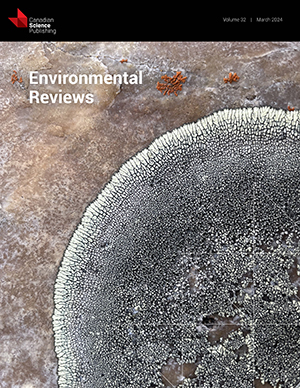开发生态系统模型组合,支持安大略湖的适应性管理
IF 5.7
3区 环境科学与生态学
Q1 Environmental Science
引用次数: 0
摘要
尽管我们对安大略湖更广泛的生态系统功能的理解在不断进步,但新出现的证据表明,在准确描述外源磷(P)负荷与湖内总磷(TP)浓度之间的关系方面,还存在着基本的知识差距。尽管近海水域的磷浓度一直低于 10 μg TP-L-1 的水质目标,但整个湖泊的磷负荷似乎经常超过 7,000 吨/年的目标。安大略湖不同地点的生态条件可能截然不同,这不仅是因为沿岸有大量的城市足迹,还因为淀粉贻贝在沿岸带的固碳能力。具体而言,环境中的低 P 水平威胁着近海水域的渔业生产力,而有害的底栖藻类(Cladophora)和产生毒素的蓝藻大量繁殖则影响着近岸区域的美观/水质。本研究对安大略湖最近和正在进行的建模工作进行了技术分析,这些建模工作可用于应对生态系统 管理方面的诸多挑战。我们的目的是对该地区开发的所有主要模型进行概述,确定其基本假设、结构属性以及与从系统中获得的经验知识的总体一致性。现有的建模工作选择对下层食物网进行简约表述,并采用粒状网格配置,以有效地将近岸和离岸水域之间的水动力过程和质量传输联系起来。要再现安大略湖近岸区域的水质状况,关键是要建立全面的生态生理学模块,以再现生物可利用磷、浮游生物动力学、裸藻和藻类之间的相互作用机制。我们努力将低层食物网与渔业和生态系统服务建模结合起来,同时还对知识差距和监测评估目标进行了技术分析,以确保充分测量与管理相关的生态系统过程,并将本地建模工作的重点放在合适的性能指标上。本文章由计算机程序翻译,如有差异,请以英文原文为准。
TOWARDS THE DEVELOPMENT OF AN ECOSYSTEM MODEL ENSEMBLE TO SUPPORT ADAPTIVE MANAGEMENT IN LAKE ONTARIO
Notwithstanding the continuing advancement of our understanding of the broader ecosystem functioning in Lake Ontario, emerging evidence suggests that there are fundamental knowledge gaps to accurately describe the relationship between exogenous phosphorus (P) loading and in-lake total phosphorus (TP) concentrations. The whole-lake load appears to frequently exceed the target of 7,000 t·year-1, although the offshore-water P concentrations are consistently below the water-quality objective of 10 μg TP·L–1. Contrasting ecological conditions can prevail in different locations of Lake Ontario, owing to the significant urban footprint along the shoreline but also the capacity of dreissenid mussels to sequester P in the littoral zone. Specifically, low ambient P levels threaten fisheries productivity in the offshore waters, while nuisance benthic algae (Cladophora) and toxin-producing cyanobacteria blooms affect the aesthetics/water quality in the nearshore zone. The present study offers a technical analysis of the recent and on-going modelling work that has been conducted in Lake Ontario, and can be potentially used to address the multitude of ecosystem management challenges. Our aim is to provide an overview of all the major models developed in the area by identifying their fundamental assumptions, structural attributes, and general consistency against empirical knowledge derived from the system. The existing modelling work opted for parsimonious representations of the lower food web coupled with granular grid configurations to effectively link hydrodynamic processes and mass transport between nearshore and offshore waters. The establishment of comprehensive ecophysiological modules that will recreate the mechanisms underlying the interplay among bioavailable phosphorus, planktonic dynamics, dreissenid mussels, and Cladophora is a critical undertaking to reproduce the water quality conditions in the nearshore zone of Lake Ontario. Striving to integrate the lower food web with fisheries and ecosystem-service modelling, we also offer a technical analysis on knowledge gaps and monitoring-assessment objectives that should be addressed to ensure that ecosystem processes of management interest are adequately measured and the local modelling enterprise is focused on suitable performance indicators.
求助全文
通过发布文献求助,成功后即可免费获取论文全文。
去求助
来源期刊

Environmental Reviews
ENVIRONMENTAL SCIENCES-
CiteScore
9.80
自引率
3.50%
发文量
45
审稿时长
>12 weeks
期刊介绍:
Published since 1993, Environmental Reviews is a quarterly journal that presents authoritative literature reviews on a wide range of environmental science and associated environmental studies topics, with emphasis on the effects on and response of both natural and manmade ecosystems to anthropogenic stress. The authorship and scope are international, with critical literature reviews submitted and invited on such topics as sustainability, water supply management, climate change, harvesting impacts, acid rain, pesticide use, lake acidification, air and marine pollution, oil and gas development, biological control, food chain biomagnification, rehabilitation of polluted aquatic systems, erosion, forestry, bio-indicators of environmental stress, conservation of biodiversity, and many other environmental issues.
 求助内容:
求助内容: 应助结果提醒方式:
应助结果提醒方式:


